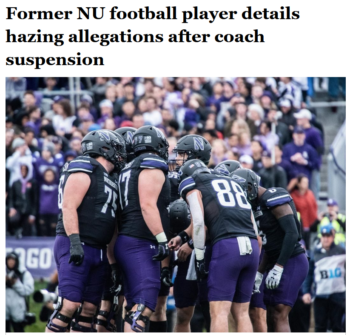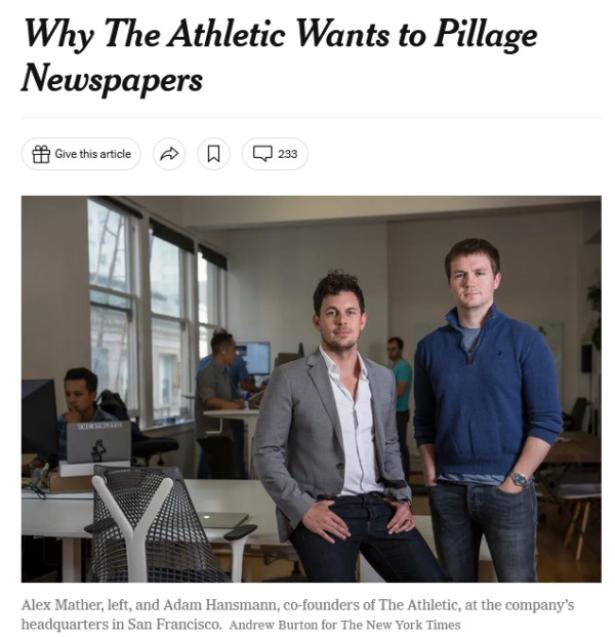Janine Jackson: Earlier this month, the New York Times made an announcement: The paper has a plan, they said, to “become a global leader in sports journalism.” Weirdly, the statement accompanied the news that the Times is shutting down its sports page. Times sports coverage is now in the hands of something called the Athletic, a sports website and app that the Times purchased a year and a half ago.
Athletic co-founder Alex Mather explained his outfit’s aspirations in a 2017 interview with, as it happens, the New York Times:
We will wait every local paper out and let them continuously bleed until we are the last one standing. We will suck them dry of their best talent at every moment. We will make business extremely difficult for them.
An Athletic editor tweeted a week or so ago, “Don’t be fooled by the cranky ‘sports journalism is dying’ tweets. The future has never been brighter.” The future of what, exactly, you might ask.
Dave Zirin is sports editor at The Nation as well as host of the Edge of Sports podcast. He’s author of a number of books, most recently The Kaepernick Effect: Taking a Knee, Changing the World, and he’s a writer/producer of the new documentary Behind the Shield: The Power and Politics of the NFL. He joins us now by phone from Takoma Park, Maryland. Welcome back to CounterSpin, Dave Zirin.
Dave Zirin: Oh, it’s great to be here. Thanks for having me.

The Nation (7/14/23)
JJ: Let me ask you, I guess, to start with what you see being lost. Not everything is worth preserving, of course, and not everything new is bad, but this decision represents more than, well, you might want to look somewhere else for box scores, yeah?
DZ: Yeah. I mean, we’ve been losing local coverage all over the country in the world of sports. Now, what does that mean? It doesn’t just mean that your local high school doesn’t get the attention it deserves, although, frankly, that is something.
It also means that all of the local scandals that invariably arrive through sports, whether it’s the public funding of stadiums and all the skullduggery that goes on with that, whether it’s the cozy relationships between political officials and team owners, whether it’s bad behavior by players in a public setting that in some way, shape or form endangers the public: All of these things are a product of local reporting, in terms of informing the public who these people are that we’re cheering for and what these teams represent that we’re cheering for.
The ascension of the Athletic is the negation of that kind of local sports coverage. It’s basically, even though it has a lot of talented reporters, many of whom are my colleagues and friends, a hedge fund posing as a sports operation that aims to hurt local sports pages all over the country.
And the issue here: It’s not just about the quality of the New York Times sports page historically, it’s not just about its Pulitzer Prizes and assorted awards or names that I grew up with, the Dave Andersons, the Harvey Aratons, the Red Smiths, for goodness’ sake, the Bob Lipsytes, these legendary names—Selena Roberts, Sonja Steptoe. It’s not just about that.
It’s the fact that it’s the industry leader, the New York Times, it really signals how dire the situation is nationally.
JJ: And it sounds like there’s things to know, you’ve started to tell us, that we need to know about the Athletic in particular, and the kind of rules by which they run their operation.
DZ: Yeah, it’s a union-busting operation, and it’s about presenting itself as a possibility for outsourcing for your local media baron that is having union troubles. We just saw this in the New York Times, where the New York Times workers, they stood together strong. The journalists stood together. I believe it was a one-day strike. Correct me if I’m wrong.
JJ: I believe so.

Dave Zirin: “When you get rid of local coverage, what you also get rid of is the watchdog that is so important…. It’s not all fun and games.”
DZ: And what it did was, it put the Sulzbergers and company back on their heels. What do they do in response to that? Oh gee, by sheer coincidence, hey, we’re shutting down a section of the newspaper, of course populated by Guild workers, union workers, and we’re replacing it with this non-union operation that, frankly, we’re already paying for. And we’re going to put it under the guise of, as Sulzberger said, this is going to make us the leader in sports.
So these people live in Bizarro World, the Superman world where everything is opposite. So they say, “Hey, we’re going to have the best sports coverage in the world.” After you fire or reassign all your sports reporters? That’s how you make the step to have the best sports coverage in the world?
But no, they’ll say, we have the Athletic, it’s a national operation. But as I said earlier, especially when you’re talking about the city of New York, when you get rid of local coverage, what you also get rid of is the watchdog that is so important, because of the corruption so endemic to the business of organized sports. It’s not all fun and games.
JJ: Some of the conversation makes it seem as though people really just were looking for scores from last night’s games. If that’s all you think sports coverage is, well then maybe nothing’s being lost. But that isn’t what it can be, and that isn’t what it is at its best.
And then another thing that was noted in this 2017 New York Times piece, and it’s been noted elsewhere—I like the way it was described, so I’ll use that quote: “They don’t hew to traditional, they would say antiquated, norms” about editorial independence. They have deals with teams, they have ties to gambling apps, and that’s out of the same mouth that they’re talking about quality journalism.
DZ: Amazing. And the infestation of the gambling apps, which I have described on other occasions, is really nothing more than a regressive tax on sports fans, and preying on addiction issues that exist in the general populace, for the broader purpose of further filling the coffers of organized sports. I mean, this has been an economic boom for organized sports.
And it’s the similar mentality of the hedge fund that is really running the Athletic, it’s the hedge fund mentality that says, where is profit to be found? It’s not to be found in creating, it’s not to be found in jobs. Profit is to be found by picking the meat off the bones of what’s left. It’s declinism writ large.
So to fund the gambling that’s done by fans, which further funds sports, which makes the players and particularly ownership that much richer—like I said, a regressive tax—but yet one that goes into the pockets of ownership, not like the lottery, where it goes to state funding for schools or whatever. I mean, it’s like a privately run lottery system, and I mean, frankly, betting is basically a lottery system, as some of us have found out the hard way.
But the second part of that, too, is the connection with the teams themselves, the foregoing of editorial independence, has created—I mean, this is a crisis in sports journalism.

Daily Northwestern (7/8/23)
And the quote you read by an editor at the Athletic named Stewart Mandel, about people like myself, “stop bellyaching and crying about the state of sports journalism”—he was using as an example the very inspiring story of the Northwestern sports journalists at Northwestern University.
They uncovered this terrible scandal involving hazing and brutality on the football team. It caused the head coach, who’d been there forever, to get fired. And so he’s saying, “look, sports journalism’s alive and well; look at the Northwestern paper.” But where are these people supposed to work? And how are they supposed to do similar journalism, even if they are lucky enough to get a job, if they work for somewhere like the Athletic that quashes their story?
And even if the Athletic wouldn’t spike a story like this, let’s be honest, anybody who’s worked in mainstream media will agree with what I’m about to say: There is something called the “invisible censor” in every mainstream newsroom, where sometimes you don’t need an editor to spike a story, but you just know, whoa, if I run afoul of the Northwestern football team, then that could somehow affect my prospects, because of the Athletic’s relationship with that powerful institution.
JJ: Absolutely. Well, of course, we at FAIR, and on this show, talk constantly about the conflicts between journalism as a public service and media as a business. This is an attenuation of that, hyped-up evidence of that.
But I always say, can we at least not fall for the same BS again and again? “If you let us merge, we’ll do double the good reporting. Bigness and market dominance is going to lead to quality.” You’ve said it really already, but this is codswallop, this argument.
DZ: It is codswallop. That’s a word I’m going to use in the near future. Thank you.
The part, though, that I want to accentuate before we finish up is something that you just said that I think is so important, which is this conflict between commerce and principled reporting exists in every newsroom, you have to say, under the umbrella of the mainstream media, of course.
And yet, at the very least, in the New York Times sports section case, it was a conflict. This feels so much more like a surrender.
JJ: All right, I’m going to end on that note. We’ve been speaking with Dave Zirin, sports editor at The Nation. You can find his piece, “The End of the New York Times Sports Page Is a Tragedy,” online at TheNation.com. Dave Zirin, thank you so much for joining us today on CounterSpin.
DZ: Thank you for having me. I really support and respect the work that you do.
Dave Zirin is the sports editor of The Nation and the author of The Kaepernick Effect: Taking a Knee, Changing the World.
Janine Jackson is FAIR’s program director and producer/host of FAIR’s syndicated weekly radio show CounterSpin. She contributes frequently to FAIR’s newsletter Extra!, and co-edited The FAIR Reader: An Extra! Review of Press and Politics in the ’90s (Westview Press). She has appeared on ABC‘s Nightline and CNN Headline News, among other outlets, and has testified to the Senate Communications Subcommittee on budget reauthorization for the Corporation for Public Broadcasting.
FAIR, the national media watch group, has been offering well-documented criticism of media bias and censorship since 1986. We work to invigorate the First Amendment by advocating for greater diversity in the press and by scrutinizing media practices that marginalize public interest, minority and dissenting viewpoints. As an anti-censorship organization, we expose neglected news stories and defend working journalists when they are muzzled. As a progressive group, FAIR believes that structural reform is ultimately needed to break up the dominant media conglomerates, establish independent public broadcasting and promote strong non-profit sources of information.
FAIR’s work is sustained by our generous contributors, who allow us to remain independent. Donate today to be a part of this important mission.


Spread the word